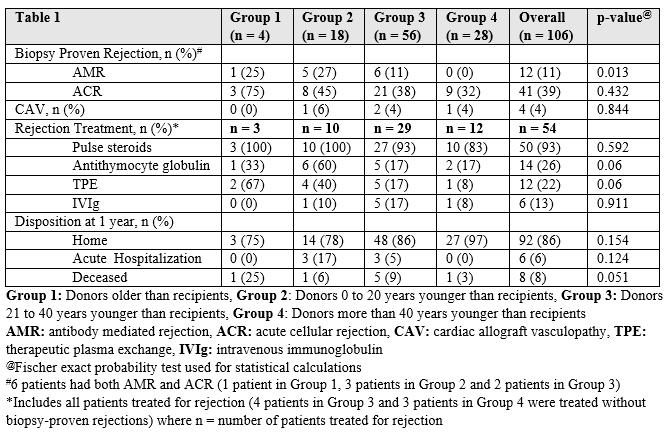Impact of Donor and Recipient Age Difference: Outcomes within the First Year of Orthotopic Heart Transplant
Baylor St. Luke's Medical Center, Houston, TX
Meeting: 2021 American Transplant Congress
Abstract number: 1188
Keywords: Age factors, Graft failure, Rejection
Topic: Clinical Science » Heart » Heart and VADs: All Topics
Session Information
Session Name: Heart and VADs: All Topics
Session Type: Poster Abstract
Session Date & Time: None. Available on demand.
Location: Virtual
*Purpose: In recent history, the number of patients listed as eligible to receive a heart transplant has increased by nearly 40%. However, not all hearts that are offered for donation are acceptable organs to be placed in recipients and the highest rates of rejected hearts were those from older donors. This study aims to determine whether donor and recipient age differences have an impact on transplant-associated adverse events within the first year post-transplant.
*Methods: This was a retrospective, single-center, observational study conducted at CHI St. Luke’s Health Baylor St. Luke’s Medical Center (BSLMC) to determine incidence of graft survival one year post-heart transplant and transplant-related morbidity. Data were collected on adult patients who were transplanted at BSLMC from January 2012 to July 2019. Patients were excluded if they were lost to follow-up less than one year post-transplant, had a prior transplant or received dual organ transplantation. Patients were grouped based on differences in age between donor and recipient. Group 1 had donors older than recipients, Group 2 had donors 0 to 20 years younger than recipients, Group 3 had donors 21 to 40 years younger than recipients and Group 4 had donors over 40 years younger than recipients. Rejection was defined as biopsy-proven grades of at least 2R or greater or C4D positive based on the International Society for Heart and Lung Transplantation criteria.
*Results: Information for 106 donors and recipients was included in this study, shown in Table 1 below. Results were considered significant for p-values less than 0.05. The only significant outcome was found in rates of antibody mediated rejection (AMR), with 25% of patients in Group 1 positive for AMR, compared to 27% in Group 2, 11% in Group 3 and 0% in Group 4. Of note, rates of death one year post-transplant were highest in Group 1 patients at 25% compared to only 6% in Group 2, 9% in Group 3 and 3% in Group 4.
*Conclusions: This study demonstrated higher rates of rejection within the first year after a heart transplant in those recipients with older donors (Group 1) and recipients with donors less than 20 years younger (Group 2). Additionally, although not statistically significant, Group 1 patients demonstrated numerically higher death rates versus other recipient groups. However, given the limited sample size of Group 1, this study indicates that further research needs to be completed.
To cite this abstract in AMA style:
Mascetti M, Manson M, Truman Z. Impact of Donor and Recipient Age Difference: Outcomes within the First Year of Orthotopic Heart Transplant [abstract]. Am J Transplant. 2021; 21 (suppl 3). https://atcmeetingabstracts.com/abstract/impact-of-donor-and-recipient-age-difference-outcomes-within-the-first-year-of-orthotopic-heart-transplant/. Accessed February 27, 2026.« Back to 2021 American Transplant Congress

